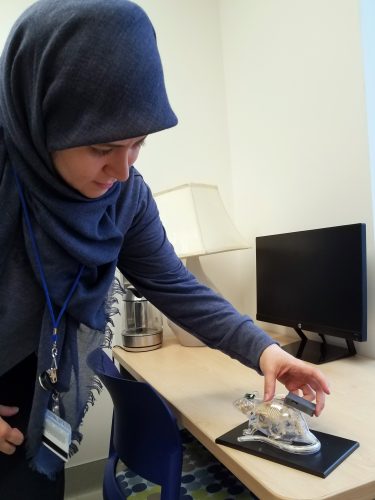UAF researcher lands federal grant to boost brain research
October 24, 2019
Jeff Richardson
907-474-6284

A promising new tool for stroke research has earned University of Alaska Fairbanks researcher Bahareh Barati a Small Business Innovation Research award from the National Institutes of Health.
Barati has a background studying therapeutic hypothermia, which works to understand the body chemistry of hibernating animals to develop treatments for brain injuries. The $347,000 NIH award will help Barati create a better way to monitor brain function and diseases in laboratory animals.
Barati, who has worked at UAF’s Institute of Arctic Biology since 2013, said the most common techniques for brain scans are either designed for humans or prohibitively expensive to use on small animals. That has made it difficult for researchers to evaluate whether stroke treatments on rats and mice are effective before moving to expensive clinical trials.
To fill that gap, Barati developed her own scaled-down optical imaging device. It includes a tiny probe that the animal wears on its head, which is attached to a thumb-sized processor inside a rat-sized jacket. The technology allows researchers to monitor brain function while animals go about their daily activity, without further surgeries or anesthesia.
“It’s very challenging — you have to miniaturize the entire technique,” Barati said. “We hope with this technology we can determine the extent of the injury and whether the treatment improves it.”
The NIH funding will help Barati refine her prototype and conduct feasibility studies. Part of the award will also fund associated research at UAF and the University of Pittsburgh.
Barati started her own biotech company to create the imaging device, and is working with UAF’s Center for Innovation, Commercialization and Entrepreneurship to develop the product.
Thousands of researchers around the world are conducting stroke studies and other research on brain injuries, she said, which provides a large potential customer base. She said that guidance from Center ICE and NIH I-Corps training will help her connect with those researchers and create a product they can use.
“We’re from academia, not business,” she said. “These kinds of programs are helpful for exposing you to that world.”
ADDITIONAL CONTACT: Bahareh Barati, 907-474-7514, zbarati@alaska.edu


